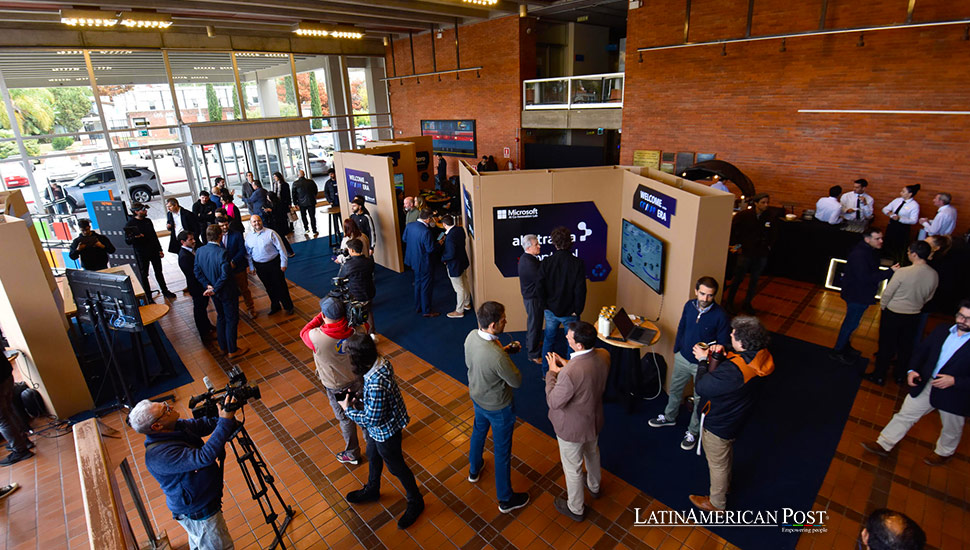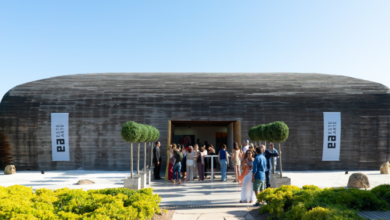Microsoft’s AI Lab in Uruguay Sets Global Benchmark for Innovation

Microsoft executives praised the potential of their AI Co-Innovation Lab in Uruguay as a foundational model for future labs worldwide following one of the company’s most successful launches.
In a significant nod to Uruguay’s burgeoning tech landscape, Microsoft executives highlighted the country’s AI Co-Innovation Lab as a cornerstone for future labs around the globe. At the ‘Welcome to the CO/LAB ERA’ event held at the Technological Laboratory of Uruguay (LATU) auditorium in Montevideo, Christopher Young, Executive Vice President of Business Development at Microsoft, and Jun Yamasaki, Global Leader of Microsoft AI Co-Innovation Labs, underscored the lab’s pioneering role in the company’s AI strategy.
A Model of Success
Launched in June 2023, the AI Co-Innovation Lab in Uruguay quickly distinguished itself as a trailblazer. Young emphasized, “On a global scale, the Uruguay lab was one of the first, and you are setting the foundation for others that will emerge worldwide to drive co-innovation around generative AI with various use cases.” His remarks reflect Microsoft’s broader vision for replicating the lab’s success in other regions.
Yamasaki echoed this sentiment, celebrating the lab’s achievements during its first year of operation. “The momentum from the start was fantastic,” he stated. As Microsoft’s fourth AI lab globally and the first in Latin America, the Montevideo lab has generated 40 end-to-end projects and engaged over 100 clients in its inaugural year.
Driving Innovation and Collaboration
The lab’s success is attributed to its robust collaboration framework, which has attracted many international companies seeking to integrate AI into their operations. “I’m proud of the number of companies coming from outside Uruguay to understand how they can implement AI in their businesses. We’ve seen an influx of around 25%, and we reached this point even sooner than anticipated,” Yamasaki noted.
The event, which marked the lab’s first anniversary, featured a performance designed with AI and included notable attendees such as Uruguay’s Vice President Beatriz Argimón and Foreign Minister Omar Paganini. The gathering underscored the strategic importance of the government’s partnership with Microsoft in fostering technological advancement.
Government Support and Vision
Vice President Beatriz Argimón lauded the government’s proactive approach in collaborating with Microsoft to establish the AI lab. “It is an honor to represent a government that took a bold step, investing energy into shaping our future. This initiative ensures that future generations inherit a country that took the right steps at the right time and faces new challenges with optimism,” Argimón affirmed.
Latin American Context
Uruguay’s emergence as a tech hub is part of a broader trend in Latin America, where countries increasingly embrace technology to drive economic growth and innovation. The region has seen significant investments in technology infrastructure, education, and startups, positioning itself as a competitive player in the global tech industry.
Countries like Brazil, Mexico, and Colombia have also made substantial strides in fostering tech ecosystems. Brazil, for instance, is home to a vibrant startup scene and has attracted significant foreign investment in its tech sector. Mexico’s tech industry is bolstered by its strategic location and strong ties to the U.S. market, while Colombia has focused on innovation and entrepreneurship to drive its tech growth.
With its stable political environment, high literacy rates, and progressive policies, Uruguay has positioned itself as a leader in Latin America’s tech landscape. The country’s commitment to innovation is evident in its initiatives to integrate technology into various sectors, including agriculture, education, and artificial intelligence.
AI in Latin America
The AI Co-Innovation Lab in Uruguay is a testament to Latin America’s growing role in the AI revolution. AI technology can transform various industries in the region, from healthcare and finance to agriculture and education. By leveraging AI, Latin American countries can address complex challenges, improve efficiency, and drive sustainable development.
AI can enhance diagnostic accuracy, streamline administrative processes, and personalize treatment plans in healthcare. AI-driven technologies can optimize crop yields, reduce waste, and improve supply chain management in agriculture. The financial sector can benefit from AI through improved fraud detection, personalized financial services, and enhanced customer experiences.
Moreover, AI can be crucial in addressing Latin American social and economic disparities. By providing access to advanced technologies and data-driven insights, AI can empower underserved communities, improve education outcomes, and create new economic opportunities.
The Path Forward
As the AI Co-Innovation Lab in Uruguay continues to thrive, it is a model for other countries in the region and beyond. The lab’s success demonstrates the importance of public-private partnerships, government support, and a collaborative approach to innovation. Uruguay is paving the way for a future where AI drives significant social and economic impact by fostering an environment that encourages experimentation and collaboration.
The lab’s achievements highlight the importance of investing in education and skills development. To fully harness AI’s potential, it is crucial to equip the workforce with the necessary skills and knowledge. This involves not only technical training but also fostering a culture of continuous learning and adaptability.
Conclusion
Microsoft’s AI Co-Innovation Lab in Uruguay is a beacon of innovation and collaboration in Latin America. Its success story underscores the potential of AI to drive transformative change and highlights the importance of strategic partnerships and government support. As the lab sets the stage for future AI initiatives, it exemplifies how a small country with a big vision can significantly impact the global tech landscape.
Also read: Santander Reports Unauthorized Data Access in Chile, Spain, and Uruguay
Uruguay’s commitment to fostering a forward-looking tech ecosystem, coupled with the expertise and resources of a global giant like Microsoft, creates a powerful synergy. This partnership is a win for Uruguay and a blueprint for other countries aspiring to become leaders in the digital age.





